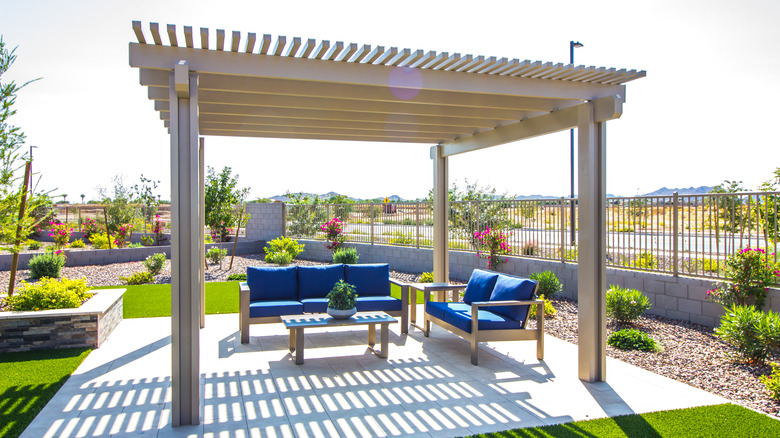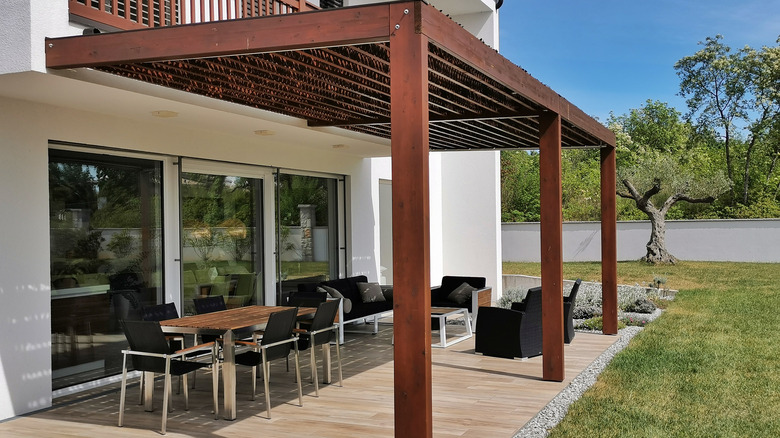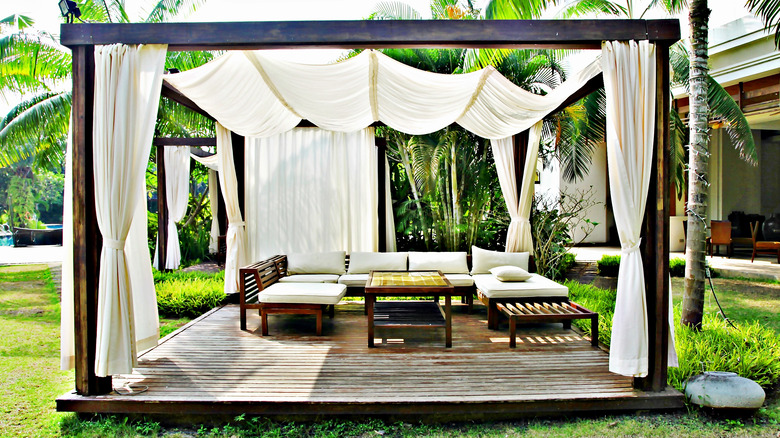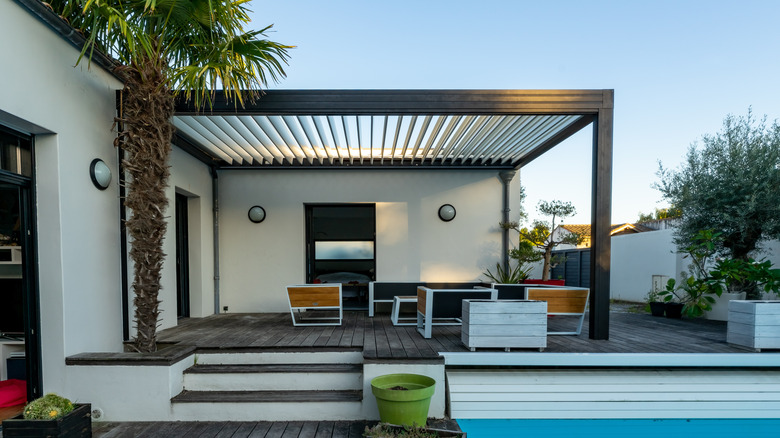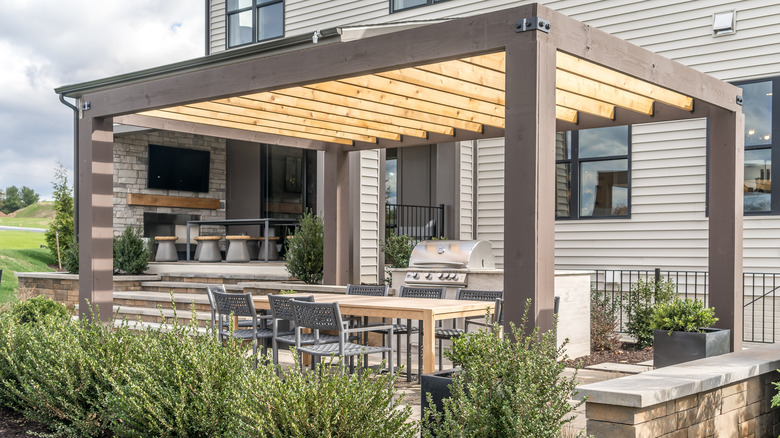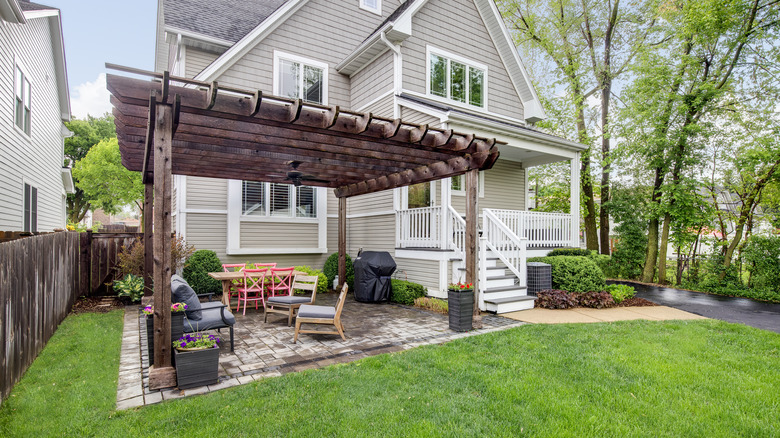How Much Does A Pergola Cost?
A pergola is a structure used in yards to create an additional living space, but how much does it cost to install? According to Forbes, it costs between $2,200 and $5,900 to build a pergola, with the average cost being around $4,000. A smaller and more basic structure may be closer to $1,000, while a large, custom-built pergola may cost over $10,000. You can also build a pergola yourself for a cheaper cost using materials and instructions from a home improvement store.
Pergolas are structures consisting of four legs and a roof, typically made of wood, aluminum, or fiberglass. The most common type of pergolas is wood, but its price varies depending on what kind of wood you choose to use. These structures are often used for outdoor dining or lounge spaces or as an extension of garden space. They are a beautiful layout to add to your yard and can add to the value of your home.
Factors for cost
Many factors determine the price of a pergola, and considering all the price aspects is a must when buying or building it. Home Advisor explains some of the primary factors that determine the price of a pergola.
Size
The first factor that determines the price of your pergola is the size of the structure you are planning to build. Pergolas can be either square or rectangular and can range from 10-feet by 4 feet to as large as 10-feet by 20 feet or even bigger. On the smaller end of the spectrum, a 10-foot by 4-foot pergola will cost around $2,000 to install; on the other hand, a 10-foot by 20-foot pergola will cost up to $12,000.
Material
The material is another factor to consider when building a pergola as it significantly impacts the final price. The most commonly used material for pergolas is wood, such as pine, cedar, or teak, but you can also use aluminum, which is a less expensive option than wood.
Attached vs. stand-alone pergolas
Determining whether you are building a pergola attached to your home or a stand-alone structure is another factor to consider. While attached pergolas will only require two posts to hold it up — meaning the cost will be slightly less — a stand-alone structure in your yard will need four posts, and the price will be somewhat higher.
Additional costs
As with any home project, there will be additional costs associated with buying or building a pergola. Hometown Structures describes a few of the additional costs that may affect the overall cost of your pergola.
Electrical
Because pergolas are open structures and don't have any built-in walls, they rarely have electricity. However, if you prefer your pergola to have lights, fans, or outlets, it will need power. If you choose to add electricity to your pergola, expect an approximately $600 additional cost: An electrical kit can easily reach $300, and the installation can add $300 more to the final price.
Curtains
A common addition to pergolas is curtains. This allows for more privacy, which is why many opt to include this feature to their pergola. The cost of a curtain will depend on the size of your structure, but typically if you are looking for a curtain that will cover each side of the pergola, you will be paying anywhere from $100 to $1,000.
Roof
Forbes explains that adding a solid roof to the structure will contribute to a higher cost, but it will also allow you to use your pergola in any weather conditions. Roofs can be made of wood, metal, or cloth, with cloth being the least expensive option. Depending on what type of pergola roof you choose to include, you may be paying an additional $500.
Types of pergolas
Most pergolas will have two or four support legs with a crisscrossed roof structure. This structure is standard; however, the materials used to build pergolas can differ, determining the final price. Home Improvement Cents describes the different types of pergolas you can use as an inspiration.
Wood
As the most prevalent pergola type, there are several wood options to choose from. Pine is the cheapest, costing $24 to $36 per square foot. Although this wood requires yearly maintenance and is easily damaged by insects, it can last 10 to 15 years with proper care. Cedar is another popular option, costing $30 to $42 per square foot. Cedarwood pergolas will last five to 12 years if properly maintained, but this wood type is resistant to rot, insects, weather, and warping. Another type of wood often seen in pergolas is teak because of its durable nature and long lifespan of up to 40 years with proper maintenance. This wood comes with a high price tag, though, costing over $60 per square foot.
Aluminum
Aluminum pergolas are also popular because they require little maintenance and can be made to resemble wood. They are strong, can withstand just about any weather, and don't undergo insect damage or rot like wood pergolas. Aluminum structures are also the cheapest option, costing $12 to $36 per square foot.
Fiberglass
Fiberglass pergolas are an option that many people choose because they can last a lifetime with very little maintenance. In addition, fiberglass pergolas are resistant to rot, insects, and mold, and they can withstand harsh weather. These positive attributes come with a high price tag, though: Fiberglass pergolas are the most expensive option, costing $72 per square foot.
Why you need a pergola
Pergolas are an excellent addition to your backyard living space, especially if you want to spend more time outside and be protected from the elements or have some privacy. There are many reasons to install a pergola, and Outdoor Living Today discusses a few.
Privacy
If you have a backyard visible to neighbors, pergolas are a great way to increase your privacy. Using curtains will give you more privacy by creating a closed space. Pergolas also protect from the elements and provide a shaded place to hang out during the sunny summer months.
Additional Space
A considerable advantage of having a pergola is that it creates additional space for you and your family or friends to spend time together. Many people put dining tables or lounge furniture under their pergolas for an extra eating or entertainment space. Not only does a pergola provide additional living space, but also room for plants. You can create a garden space in your pergola with hanging or vining plants.
Add value
Pergolas also add value to your home by including an attractive and practical element to your home's landscaping. They add structural interest to your yard, which can help increase the value of your home.
Benefits of pergolas
Pergolas make a wonderful addition to just about any home. Having a pergola in your yard has many benefits, and Home Guides talks about a few specific benefits.
Free-standing design element
Pergolas create visual interest in any backyard because they are a free-standing design element. They especially shine when you add plants and flowers to them. These structures give you an entirely new space to design outside your home.
Maximizes outdoor space
One of the major advantages of pergolas is that they maximize your outdoor space by providing specific dining or lounge furniture space. So if your yard feels cluttered and you want a clear dining or lounge furniture area, a pergola can provide that.
Lots of variety
A primary benefit of buying or building a pergola is that there is a lot of variety in size, material, and, most notably, cost, as per The Backyard Showcase. This means that you have tons of options when it comes to designing the pergola of your dreams, allowing you to create a space to fit your unique wants and needs.
